Podcast: Play in new window | Download
Subscribe: RSS
You’ve nailed the queries and keywords that will drive your SEO efforts.
You’ve created high-quality content that matches your query list.
But things may not be going as well as you thought.
Maybe your not ranking well enough for highly competitive terms that will drive motivated users to your website.
Maybe you do rank, you’re getting some traffic but users are just visitors, they’re not taking action.
What could possibly be happening?
To figure things out, we’ll need to take a deep dive into Search Intent.

What’s New?
What’s new in marketing: LinkedIn adds reviews and ratings for profiles and native video meeting options, Instagram adds new audio tab to its search options, and Facebook announces new updates.
LinkedIn Adds Reviews and Ratings for Profiles – LinkedIn is adding a new review element to its professional services listings, which will provide another way to highlight the quality of your professional skills within your LinkedIn profile details.
LinkedIn Adds Native Video Meeting Option – After adding support for various third-party video providers over the last year in order to facilitate video meetings in the app, last week, LinkedIn quietly rolled out a new, native video option within its messaging platform, which provides another way to connect with users, without the need to download a separate video app.
Instagram Adds New ‘Audio’ Tab to its Search Options – Instagram has added the capability to seek for audio particularly inside the search tab within the app, making it simpler to faucet into traits based mostly on music clips, with a concentrate on Reels creation based mostly on the identical.
Facebook Ads Announces Updates to Targeting Minors, Instagram Shop Ads, & More – Facebook is updating the way that minors can be targeted, testing ad placements, and releasing a new tool for advertisers. Learn more!
What’s Working?
When you understand search intent, it acts as that secret ingredient that brings your content strategy to the next level.

You are often sitting on amazing content but just aren’t ranking for the right queries.
This happens when the queries don’t match the intent.
Beyond Keywords: Understanding Search Intent
What is Search Intent?
The end goal a user has when searching a query in a search engine.
Most often than not, users search for specific types of answers or resources.
If we use “burger” as an example, there are various specific topics that users could use (burger recipes, burger restaurants, best local burger). Though the topic is the same, the intent isn’t.
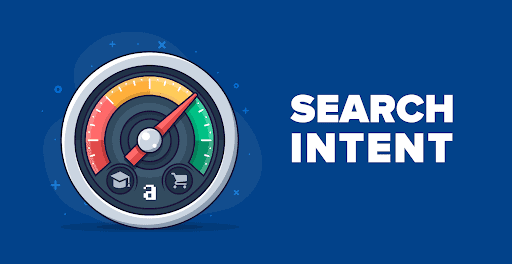
Types of Search Intent
The 4 main types of search intent you will come across are:
- Navigational
- The user wants to find a specific page or site. They are dominated by branded keywords.
- Informational
- The user wants to answer a specific question. These queries will include “how to,” “what is,” “where is,” “why do,” and other interrogatives.
- Transactional
- The user wants to complete an action (conversion). It could be an email signup, lead generation form submission, store visit, or a phone call.
- Commercial
- Similar to transactional intent, commercial intent is a great place to offer free versions of products and get yourself in front of their eyes.
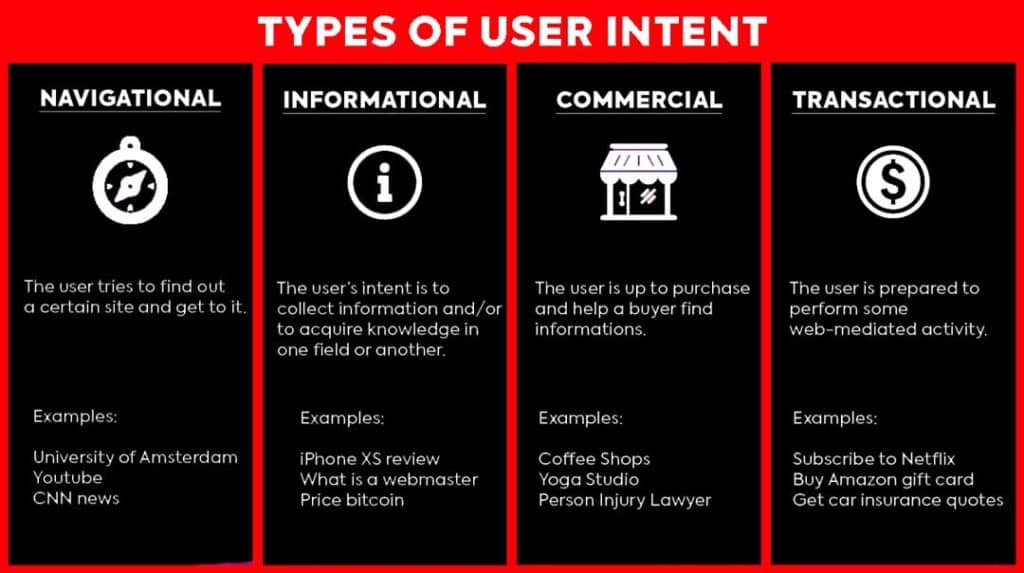
Why is Search Intent Important?
A search engine’s goal is to provide users with the most relevant result for their search. Optimizing around intent, rather than just keywords can have a great payoff for your content. This can:
- Improve rankings
- Improve engagement
- Fulfill audience needs
Understanding search intent will generate conversions and provide value to your visitors.

How to Optimize for Search Intent
Search intent optimization is all about giving the best answer exactly the way your target customer needs it.
Meeting your customers’ immediate needs and win their hearts.
Here are 3 great ways we can optimize for search intent:
- Match Metadata and Content Type to the Intent
- Examine the Competition
- Format Content for Relevant SERP Features

1. Match Metadata and Content Type to the Intent
You’ve done the research and know which keywords you’d like to target, now what?
It’s time to optimize!
You can start with your pages’ metadata. Here you’ll want to update your title and description tags, H1, and H2s to reflect your specific keyword.
To get that click-through up, leverage your title with some snappy copy. (But avoid making it clickbait.)

2. Examine the Competition
Like any other competition, it’s always good to understand who the current winners are.
Take a look at the top-ranking pages:
- How are they formatted?
- What’s their tone?
- Which points do they cover?
- What are they missing?
Now create the best, most relevant pieces of content on the chosen topic.

3. Format Content for Relevant SERP Features
Researching SERPs can help you understand what information your search engine
(ex. Google) deems relevant. This can help you plan your content strategy – what results does Google show front and center?
Now, think about structuring your content to optimize for Rich Results.
Structuring your content to be clear and concise will help users find quick solutions to their search queries.

Best Practices of Search Intent
Let’s move on to best practices!
These will help you gain more reach and expand your business while using this method of search intent.
Best Practices Being:
- Uncovering search intent
- Optimizing/improving user experience
- Improving existing content
- Optimizing commercial content
- Plus more!

Uncover Search Intent
Before you begin, take a look at the search intent for your keyword.
Mostly all search falls into informational, navigational, commercial, and transactional.
Even if the search intent is obvious, you want to still look at the pages that rank for that keyword.
The first page links have passed Google’s user intent test, so you want to create a page that closely matches the content.
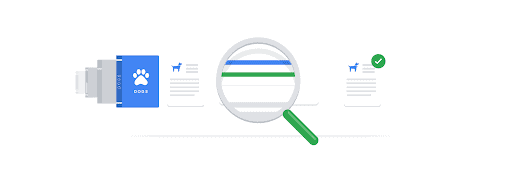
Optimize for User Experience
Your ultimate goal when creating a website is to fulfill a user’s needs. Ensure that every person who visits your page has a positive experience, and receives the information they’re looking for.
Google studies how users interact with SERPs. They can tell if people are not finding success on a page, and will, in turn, push those pages further down the results.
How do you ensure your page stays at the top of the list? There are steps you can take to improve the user’s journey.

Improving User Experience
Creating Clear & Concise Information
Content that is easy to read with clear fonts and text hierarchy. Proper use of subheadings, H1 and H2 tags.
Visual Elements
Using eye-catching elements such as videos and imagery will not only break up the page but can also help users better understand your written content.
Lists
Format information in an easy-to-read structure. Users are able to find what they’re looking for quicker, and will in turn have a positive experience.

Improve Existing Content
You’ve got that amazing page on your site that should rank, but it’s just won’t!
There might be a search intent problem.
Go back and re-optimize your old content for search intent; it’s one of the fastest ways to get more organic traffic to your website.
Check the search intent of your keyword and find the reason you’re not ranking.

Optimize Commercial Pages
When it comes to optimizing you want to make sure that your choosing keywords that can relate to your product to improve the commercial pages’ reach and growth.
SEO helps to focus on those queries so your pages are viewed more.
The more in-depth and well-written your content is on your website, the more terms Google will rank it for.
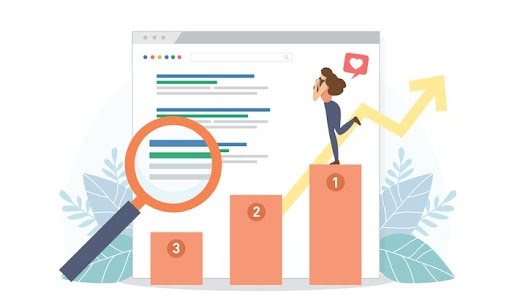
Navigational Queries
Navigational queries help people find a specific website or page on a website.
An alternative to typing a full URL.
You can still rank for navigational queries, but the click-through rate will most likely be low.
People searching for these terms don’t want to go to a third-party website.
Be careful with these search terms as your chances of redirecting their search journey to your website or product are slim.

Keywords With Multiple Intents
Sometimes you’ll come across keywords with multiple intents.
If this happens, you want to optimize harder for that one type of user intent.
When a user searches, they most likely have a singular intent, so it’s always better to focus on one specific intent and make it the best it can be.

Advanced Search Intent Optimization
Determining whether search intent is commercial or transaction is one thing, but how do we take it a step further?
If someone types in “how to do a pushup”, it is safe to say that they are looking for information, but how do they want it presented?
Video? Photograph? Paragraph?
As we mentioned, users like clear and concise information, which is why Google usually shows a list of steps when a user types “how to” in the search bar.
Optimize your content to reflect a convenient and enjoyable experience.
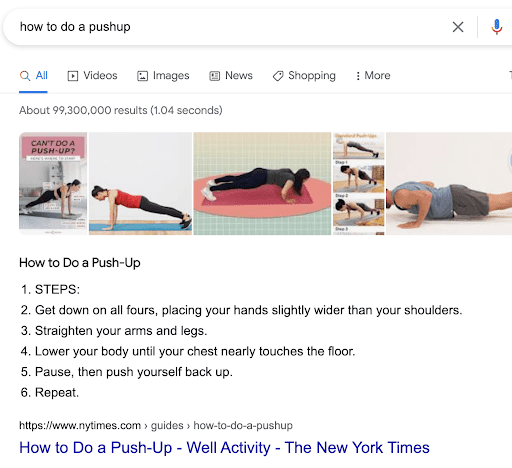
Wrapping It Up
You always want to do your research into search intent to fully understand what that keyword can provide you.
If the results aren’t focused on the topic you need, consider changing or finding a query that will be more effective.
Understand your intent before you dive in.
We hope you enjoyed this read. If you’re looking for more great content, check out some of our other reads below:

